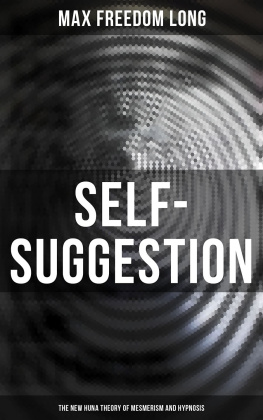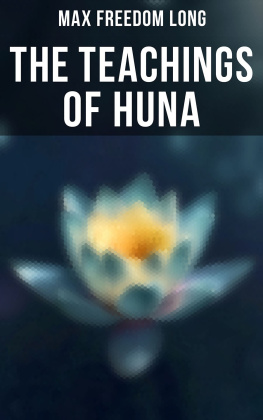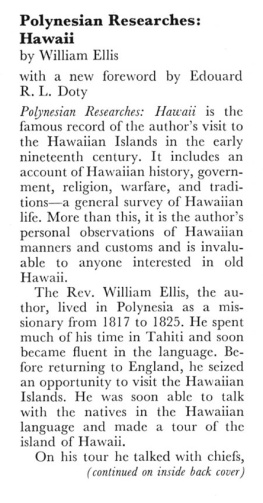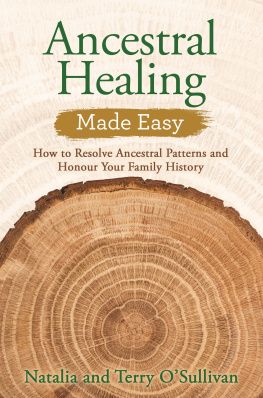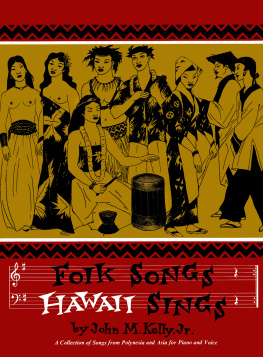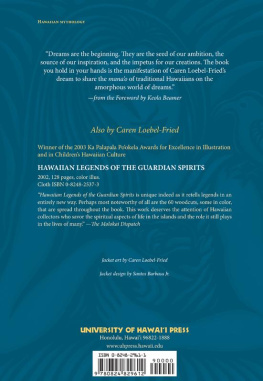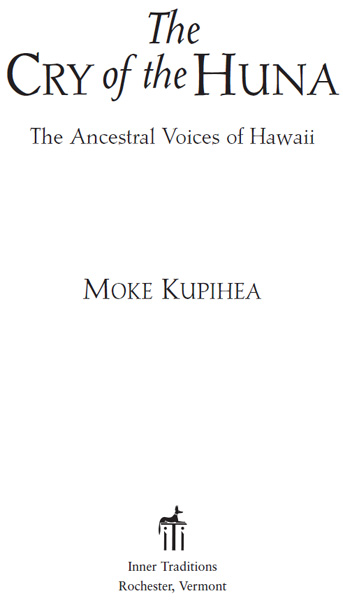
Prologue
Na Makahiki: 1950 C.E.
I was born and raised not far from Paliuli, once an ever-verdant upland of the gods in the days of old, which had deteriorated by my time into a precipitous house of refuge that provided asylum to ancestral remains. It is a house, however, to which I became bound by the inherent traditions of my forefathers in my youth. The house is one of light (ao) and one of darkness (po): the light of ones immediate ancestors, and the darkness of ones remote ancestors. In the house is a spirit world, a spirit world that I have come to call ao aumakua, the world in which hereditary spirits seek to look out and cling to their descendents world of living light. I go there from time (au) to time, to enter into the parental (makua) world (honua) of ancestral beings. Upon climbing onto its eroded plateau I walk first through the remnants of an ancient garden of life and death, where as a child I came to know of the light of Akua (God) in its immortal origin and the darkness of Akua in its mortal creation. In this garden I have always experienced a visible harmony of spiritual members, a totality of inner thoughts and visions in which no part deviates from the ancestral path that I was born to walk upon. With consummate joy I walk about this most ancient of ancestral gardens, gazing at its will to survive.
In a state of deep inspiration I then walk along the precipitous rim of cliffs that drop down from the garden in the east, called Pokii (literally, the netherworld), that shelters the remains of my ancestors below. Upon reaching its northern extremity I perch on a large jutting rock called Leinakauhane (literally, the leaping place of spirits), above sheer walls of crooked, cracked, and jagged layers of lava rock that once rolled beneath the earth in the heat of life and then emerged to stand erect as a cathedral over the coldness of the death of the land. I station myself on the rocks fringe of time, to gaze upward from this leaping place of ancestral spirits who have left their only earthly remnants in the cracks, crevices, and caves that act as a cemetery beneath my cathedral seat.
I gaze upward to a glorious harmony of space and time whose destiny humankind will never trample upon; rather, in the end, it will surely trample upon humankind. It is as though I am looking up from atop the first altar of my ancestors to the invulnerable church (heiau) of their God, the Akua.
Below, theres not a dot of flesh of my ancestors true images; there are only the cracks, crevices, and caves that contain their bones. The bones are there, no matter how they have been ravaged, reaped, and scattered throughout the course of modern times. The cliffs contain the physical reality of my ancestors, and of all humanity: this reality is true; all flesh will turn to this.
It is there. It is there for me. It is there for me, not as physical reality in the spaces of this earth beneath me, but as physical reality in my own memory, in the depths of the ancestral pathway that I was born to walk upon.
I have stood in the garden of origin of my first ancestors. I have been united with their remains there, and, through those remains, been united with the voices who built the first altar that brought them there. This is what I perch upon. The memory of their voices in transaction with the akua (gods) and people of old continues to echo today, whispering in every Hawaiian. Their voices whisper from deep within the soul of every survivor of the indigenous people of ancient Hawaii nei (Hawaii as a whole), even though these voices have been stifled by Western religious concepts of the perfection of their belief in Christianity, which placed the indigenous gods of people around the world into their physical remains to rot in a city of worms.
Butfor the survivors of the race who have yet to enter the city of wormsthe voices whisper, the voices whisper, outside of its gates of rot.
Outside of its gates of rot,
Is the door to your ancestral heart.
In your inner ear, deep within,
Hear the whispers of ancestral souls, the voices of the people of old.
They are whispering to those who choose not to hear,
Whispering to those who choose to distance themselves
from the source of the whisper
deep within their own inner ear.
Still the murmuring goes on,
The murmuring goes on,
with the will to survive,
the will to survive.
There it is. There it isdid you hear?!
From this the perfection of the Western concept of Christianity cannot separate me. Nothing can separate me from the sacred voices of the first garden of my ancestors. For I have spent my life gazing at its will to survive.
E Kolo Ana No Ke Ewe I Ke Ewe: The Rootlets Will Creep Toward the Rootlets
The hereditary priests, seers, and prophets of the people of old were known by many specific names but now they have all come to be called kahuna. Like the two sides of a coin, a kahuna has two faces. One is an invisible tail that is an extension of his spine. This tail is like that of a lizard (moo), which can regenerate what its hindmost has lost. This is the tail of the fetcher of ancestral spirits. The other is the visible head wherein perch the eyes that climb forth from the invisible tail. We are all trailed by our ancestors whose spirits cling upon our back. Seeking to communicate are our ancestors who still look into the world of light through our very eyes. It is like we are seeing through the eyes of a soaring bird (manu) that flies in a circle over ancient lands and people we have never seen, enabling us to recognize them. These are the eyes of the sender of ancestral spirits.
Na Makahiki: 2000 C.E.
Moke Kupihea has the strength of conviction necessary
to impart to the world a more sensitive account of
Hawaiian kahuna heritage, which comes down to him
from the priesthood line from which he descends.
RUBELLITE KAWENA JOHNSON, PROFESSOR EMERITUS OF HAWAIIAN
LANGUAGE AND LITERATURE, UNIVERSITY OF HAWAII
It is a fact that I am a native Hawaiian, born and raised in a cultural milieu that witnessed the last survivors of the race that had passed from the latter stages of the nineteenth century into the middle stages of the twentieth century; and I do in fact descend from the ancient priesthood lines of pre-Western- and post-Western-contact Hawaii, which have become known to the world as kahuna, and their beliefs as paganism and heathenism. However, I do not claim to be a kahuna, nor have I ever called myself a kahuna.
I am just a hereditary scribe who serves the ancestral voices of the past kahuna, from whom I descend, voices whose desire is to express their beliefs and their murmuring accounts of their destruction to the survivors of not only the Hawaiian race of today, but to all of Polynesia and the world at large, in a manner that all can understand.
The story I have to tell is one of the present, and one of the past, one that finds fault, and one that seeks forgiveness, as it travels to the most remote temples of Hawaiian spirituality, yet it is also one that touches upon the future of the true spirit of Polynesia. It is a story that is not unique to Hawaii or Polynesia, but one that has truly taken place time and time again, throughout the world, during one age or another. It is simply a history of spiritual genocide leading to the finding of another cultures ancestral gods on the other side.
Next page

